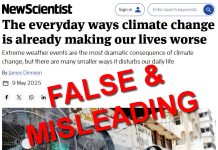It seems CNN just can’t play it straight with climate research when it goes against the narrative climate change is making extreme weather worse. Case in point is a story published by CNN which details a peer reviewed study showing climate change is likely contributing to a decline in hurricanes globally.
The CNN story, titled “Hurricane numbers are decreasing in every ocean basin except for one, study finds,” starts out mostly accurately reporting that recent research published in the peer reviewed journal Nature Climate Change concluded that the annual number of hurricanes globally, and in each hurricane basin, has declined significantly since the 1850s. CNN writes:
Before the era of satellites, it was next to impossible to know whether a hurricane occurred out in the open ocean unless a ship was unlucky enough to run into it. And scientists for decades have been trying to piece together a historical record to better understand how the climate crisis is changing these storms.
But researchers said Monday they have constructed a clearer picture than ever, and found that the frequency of the planet’s most devastating storms has decreased over the past century.
The study, published in the journal Nature Climate Change, found that the annual number of global hurricanes, typhoons and tropical storms — or tropical cyclones, more generally — declined by roughly 13% as the planet warmed during the 20th century.
Sadly CNN couldn’t play it entirely straight with the findings of the study, implying that one basin, the North Atlantic had seen an overall increase in hurricanes. This is false. What the scientists found, in fact, was that after a sharp decline in hurricanes in the North Atlantic Basin from the late 19th century to the 1950s the trend began to reverse. However, their data show even in the North Atlantic Basin, where the decline has reversed, the average annual number of hurricanes still has not reached the peak experienced in the early part of the hurricane record. In other words, fewer hurricanes are still forming in the North Atlantic now, than formed there more than 100 years ago.
The study suggests several factors related to warming that might be contributing to the decline, such as changes in the Hadley and Walker tropical ocean circulation patterns and an increase in wind shear. If this research is correct, it is not just that global warming is coinciding with a decline in hurricanes, contrary to the projections most climate models have made over the past 30 years, but rather that warming is actually contributing to the decline.
“What’s happening with global warming is that these underlying conditions are getting more unfavorable for cyclones to form in the first place,” Savin Chand, lead author of the study and a senior lecturer at the Federation University in Australia, told CNN.
Not content to let the findings of the research stand on their own, CNN encouraged Chand to speculate on whether climate change might be worsening hurricanes in other ways. Chand was happy to take the bait saying that although there may be fewer tropical cyclones in the future, it is likely they will be more intense.
“But even though cyclones are getting fewer, those that do form are now feeding more energy from the warming atmosphere, so that’s why they’re getting more intense,” said Chand. Except Chand’s own research does not show hurricanes are getting more intense. On this point, the paper by Chand et al. states “the resolutions of the current reanalysis products are too coarse to make conclusions about TC intensity.”
Also, the Intergovernmental Panel on Climate Change (IPCC) writes “there is still no consensus on the relative magnitude of human and natural influences on past changes in Atlantic hurricane activity, … and it remains uncertain whether past changes in Atlantic TC activity are outside the range of natural variability,” continuing, “Since at least 1980, there are no clear trends in overall global hurricane and major hurricane activity.”
Additional research undermining CNN’s suggestion that climate change is making hurricanes worse was published recently in Nature Communications. The authors concluded:
We find here that, once we include a correction for undercounts in the pre-satellite era basin-wide NA HU [hurricane] and MH [major hurricane] frequency, there are no significant increases in either basin-wide HU or MH frequency, or in the MH/HU ratio for the Atlantic basin between 1878 and 2019…. The homogenized basin-wide HU and MH record does not show strong evidence of a century-scale increase in either MH frequency or MH/HU ratio associated with the century-scale, greenhouse-gas-induced warming of the planet. For example, the temporal evolution of the global mean temperature is not closely reflected in the temporal evolution of adjusted MH/HU ratio.
These recent reports, although important, are not in fact news in one sense. Their findings aren’t unique, but rather the research simply confirms what data cited in dozens of previous Climate Realism posts, here, here, here, and here, for example have shown: there is no evidence climate change is making hurricanes worse.
CNN could have honestly and accurately reported on important research showing that even as the Earth has modestly warmed hurricanes have declined. Instead, it had to try and turn this good news, grounded in data, into another warning, grounded in speculation not evidence, that climate change is worsening hurricanes. This claim not supported by, and was outside the scope of, the very study they were supposedly reporting on. It is also is refuted by the existing, readily available, data.



















